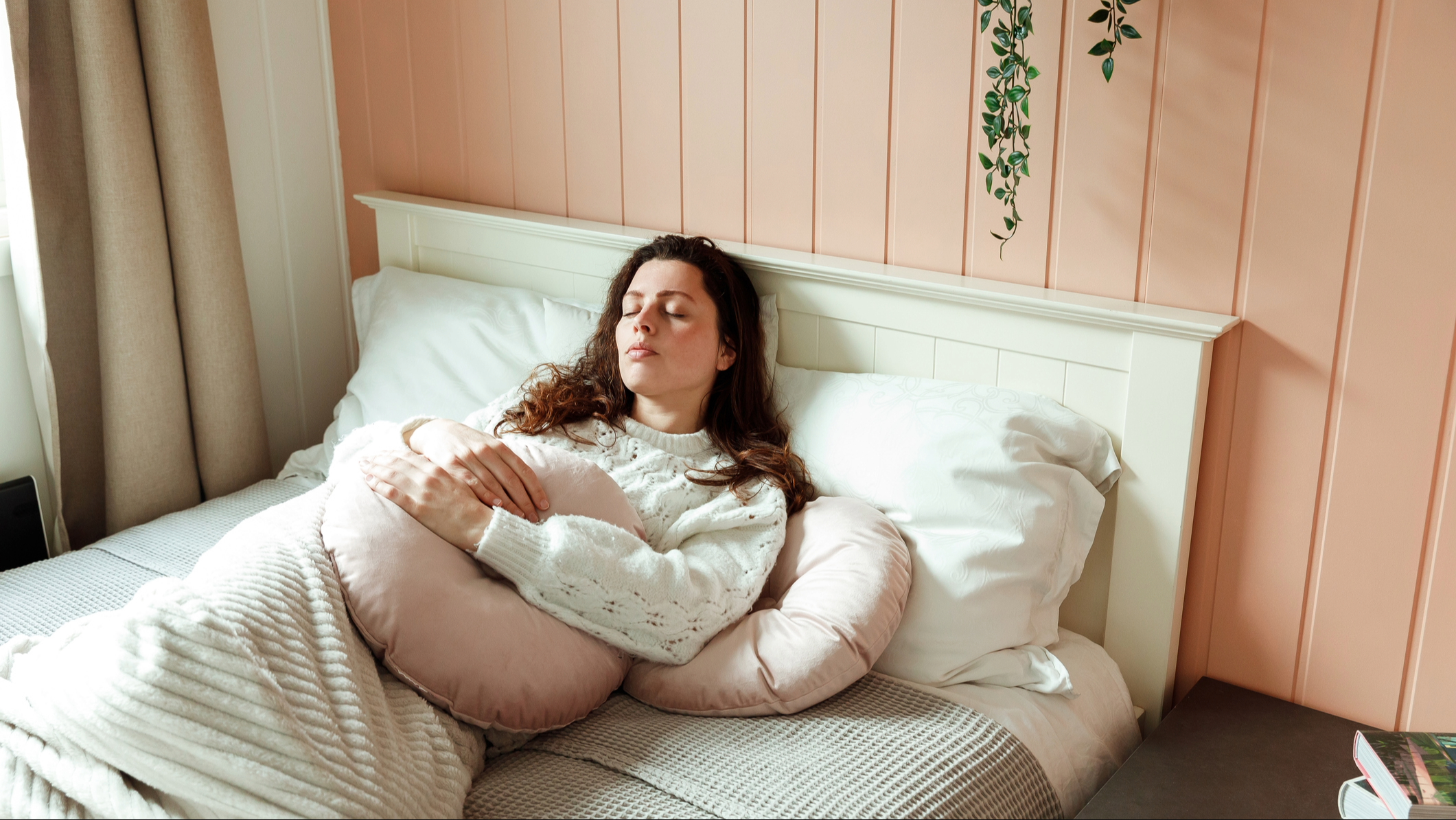How many pillows should you sleep with when you have back or neck pain?
When it comes to pillows, sometimes less is more

Your pillow should cradle your neck and head, complementing your sleep needs and enhancing overall comfort. According to a survey by the National Sleep Foundation, American adults use two pillows on average, but how many pillows should you sleep with?
To create the perfect cocoon of warmth and comfort, you might be tempted to pair the best mattress for your sleep style with piles of pillows. However, while stacked pillows can help ease congestion, for most sleep styles, one is the magic number.
In this guide we'll explore the optimum number of pillows according to your health, sleep issues, and sleeping position, with the help of a chiropractor. Whether you use one or 10, remember that the best pillows will complement your sleep surface to deliver the comfort and support you need.
How many pillows you should sleep with?
When you have neck pain
If you suffer from sleep-related neck pain, the key is to choose a pillow that supports your neck while preventing unnecessary stretching of the muscles. Your pillow should keep your head and neck in perfect alignment with the rest of your body. So if you're lying on your back, for example, your head shouldn't tilt forward.
It's best to use just one pillow if you have neck pain, as this provides cradling comfort without raising your head out of alignment. As well as twisting your neck, multiple pillows can also slide around, increasing the risk of your neck moving into a painful position while you sleep.

An orthopedic pillow is the best option for sleepers with neck pain. These feature an ergonomic design to hold the head in place while supporting the neck and shoulders. Look for one with multiple loft options, such as the EPABO Contour Memory Foam Pillow at Amazon so you can pick a height to suit your build.
When you have back pain
A recent study by the American Association of Neurological Surgeons found that between 75 and 85% of US adults encounter back pain. If you're one of the many, it's crucial to use the right mattress and pillow for maximum support without worsening your pain. Dr. Kevin Lees, director of The Joint Chiropractic, recommends "a pillow that supports your neck but doesn't prop your head up."
Sign up to get the BEST of Tom's Guide direct to your inbox.
Get instant access to breaking news, the hottest reviews, great deals and helpful tips.
Those who experience back pain will generally benefit from sleeping on a medium-firm pillow. These pillows don't have too much sink, supporting the natural curvature of the neck and promoting neutral spine alignment. A good example would be the Saatva Latex Pillow, which provides a keen combo of plush comfort and proper support.
While we recommend just the one pillow under your head, other pillows can be used strategically to limit back pain. “If you're a back sleeper, use a pillow under your knees to take the pressure off your lower back," suggests Dr. Lees.
For side sleepers with back pain, Lees recommends hugging a pillow to your chest and placing another pillow between your knees. "That should help your back to feel a bit better as you sleep,” he explains.
When you are sick
When you’re down with a stuffy nose and have difficulty breathing, falling asleep can become a nightmare. You might think a multitude of pillows is a good idea, but can propping yourself up on pillows actually help ease the discomfort?

“Some people prefer to sleep at an incline or elevated position when they have congestion. But using multiple pillows often doesn’t provide stable support, and tossing and turning can move the pillows unevenly, which may cause neck pain. It’s best to have a single or wedge pillow that provides the needed incline,” says Lees.
Consider using a hypoallergenic pillow to help reduce symptoms or, at least, not exacerbate them. The Coop Home Goods Original Pillow is a great option, as it's made from a combination of hypoallergenic memory foam and microfiber. Plus, you can adjust the loft to suit your needs every night.
- Read more: What are infinity pillows and do you need one?
- New study reveals Gen Z likes to sleep with 7 pillows— here's why that's bad news for your neck
- Casper Hybrid with Snow Technology vs Beckham Hotel Collection: Which pillow is right for your sleep?
How many pillows do you need for different sleeping positions?
Your sleeping position is a strong determinant of how many pillows you should be using. Here’s a quick guide on the ideal number of pillows for each sleeping position:
Side sleeping
Side sleeping is one of the healthiest sleep positions, and it typically requires a firm, high-loft pillow to fill the gap between the shoulders and the head. Using a knee pillow can also help keep your spine in proper alignment when you sleep on your side.

“It's best to use a firm pillow if you're a person who routinely sleeps on their side," says Dr. Lees. "When looking for a pillow, find one that has an extra-wide gusset or rectangular panels along its four sides that add to its thickness."
Lees also suggests using a body pillow. These long pillows fit between the knees and curve around the front of the body, keeping you in a healthy side sleeping position. "Some body pillows are a 'J' or 'U' shape, allowing the person to rest their head and neck on the same pillow,” explains Lees.
Back sleeping
Around 38% of adults sleep on their backs, according to a report from News Medical. Back sleeping has many benefits, from neutral spine alignment to full body pressure relief, and even reduced wrinkles and breakouts as your face isn't pressed against your pillow.
Back sleepers need a low loft, medium to soft pillow to prevent your head from tilting forward. A down or down-alternative model, like the Sleep Number Naturalfit Ultimate Pillow, can be a great option for back sleeping. It's also adjustable via inserts so you can get the loft just right.
Stomach sleeping
Similar to back sleepers, one soft, low-loft pillow will suit prone sleeping, too. Stomach sleepers are advised to strictly avoid stacking up pillows as this can compress your neck joints causing immediate wear and tear. Stomach sleeping is already bed for your back, so you want to avoid placing your spine at an even more awkward angle by piling on the pillows.

“While [stacking pillows] may feel good at the start of your night, this is because your skeletal muscles are in an active phase. However, sleep is a time of skeletal muscle inactivity, and thus pressure points are subjected to different forces,” explained Dr Rubina Tahir, a Michigan-based chiropractor, when we asked him if stomach sleepers need a pillow.

Becky is a Sleep Staff Writer at Tom’s Guide covering all things sleep-related including product reviews, research studies, news and explainers. She works on specialist bedding content and is responsible for buyer’s guides like the best pillows for all sleepers and best mattress protectors focusing on popular brands such as Tempur-Pedic, Avocado, Coop Home Goods and more. Becky is a PPA accredited journalist who is keen to explore the intricacies of sleep, its effects on skincare, mental wellbeing and work performance. While not thinking of sleep, she can be seen reading in cosy bookshops or learning about global food culture.
